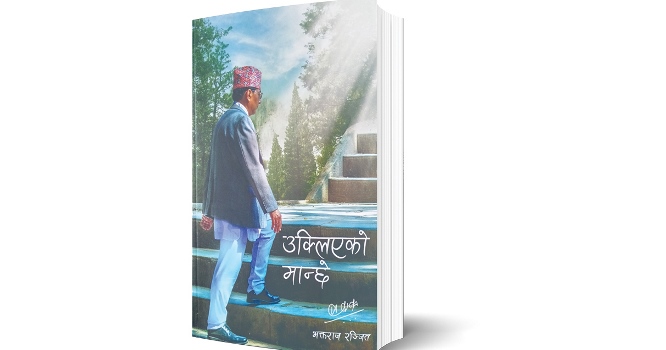Humble Words Of Success

Gandhi Raj Kafle
When a person is born and weeps in the lap of his/her mother or passes through the golden phase of growing, he never realises about his struggle in life. Struggles keep coming in life in various forms. The struggle is one that seems equal for all individuals. However, many things can make a person appear unequal. Money, property, power, education and family status are some of the things for which an individual needs to be guided by his dream to achieve them.
Therefore, in one situation a man may appear poor, but in the other, s/he may be having high family status.
Thus, the destiny, it seems, is a double-edged sword for a growing man. Here, in the context of struggle, destiny is not like property, money, or power. Struggles in fact provide all people a chance to be equal, no matter how rich or poor a person can be. The story of the life for Bhakta Raj Ranjit, in his under review autobiography, is meaningful from the viewpoint of his struggles to pursue education and career.
Ranjit has summed up his life with two Nepali words "Ukliyako Manchhe"- the title of his book.
This is a 336-page book through which he has tried to look back his life and he feels immensely happy to do it because whatever the life he is living now it is just the fruit of that struggled-filled life. In one of his important phases of life, author Ranjit had grown a good relationship with renowned journalist Bharat Datta Koirala. Ranjit served as a senior administrative official at this publication house and Koirala was the chief of the Gorkhapatra Daily.
Now, after a long time of their disassociation from Gorkhapatra Corporation, three of them, the author with this newly published book, Koirala and journalist Aditya Man Shrestha, by writing the prefaces to the book, have shared their much-loved memories related to their Gorkhapatra days.
How the author has described his life? This is the main question. By birth, Ranjit belongs to a Newar family of the capital city of Kathmandu. In this context, it is relevant to describe the Newari cultures and traditions of the Valley by the author in the starting chapter of this book. There is a powerful influence of two important religions – Buddhism and Hinduism – in the Newari lifestyle. And, the first chapter of this book briefly sheds light on the ritual to ritual introduction for readers and it makes an interesting reading for readers.
Gradually, the author proceeds towards his different aspects of life- like his childhood, youth hood, job – income generation activities, his involvement in NGOs/social work, travel, family life/retirement, some of his bitter experiences about death and feelings of victory over such incidents and finally his life's philosophy. Are there any common feelings or themes that appear repeatedly all over the book?
This question does not go unanswered. Ranjit loves to mention throughout the book that he believes in honesty and he takes education as a key element to bring a change in one's life. He has felt what his family became poor because of its own deeds.
This is the situation that has made him determined and strong on the road of his life because he feels he has always been sincere to overcome family poverty with hard works and honesty, and while doing so, he has managed to continue his college and university education. He also fondly remembers how he enjoyed engaging himself in the then popular NDS-- the National Development Service programme in Parbat District as a part of completing his Master's degree at the Tribhuvan University.
The most honoured theme of Ranjit in this book is the author's association with the Gorkhapatra Sansthan. He entered to this office service with a humble background. To him, the Gorkhapatra is great. He learned many things here and tried to contribute some new reforms to the corporation and he is thankful for the then management. He says his best wishes as a former senior staff are always with the Gorkhapatra.
Ranjit also describes his inter-caste marriage. It had not been less challenging then, he remembers. However, he writes about it from the side of his wife and praises her love, tolerance and sincerity towards him and his family. Finally, cultures, traditions and rituals move smoothly and families do not suffer if virtues of life overcome vices, he says it as per his experience in the family.
In conclusion, the author has said much symbolically with the book's title "Ukliyako Manchhe". Everyone in this world wants to move up. But the move and steps we take to lift our life differ in perception. What type of person is he?
This 336-page book has only two words- Ukliyako Manchhe- to describe him that seems very dear to the author: He does not want to rise with dishonest acts but wants to rise, make progress, wants to do social works and feel happy to work for peace and harmony. These are the two Nepali words "Ukliyako Manchhe" that tell volumes about the author.
Recent News

Do not make expressions casting dout on election: EC
14 Apr, 2022
CM Bhatta says may New Year 2079 BS inspire positive thinking
14 Apr, 2022
Three new cases, 44 recoveries in 24 hours
14 Apr, 2022
689 climbers of 84 teams so far acquire permits for climbing various peaks this spring season
14 Apr, 2022
How the rising cost of living crisis is impacting Nepal
14 Apr, 2022
US military confirms an interstellar meteor collided with Earth
14 Apr, 2022
Valneva Covid vaccine approved for use in UK
14 Apr, 2022
Chair Prachanda highlights need of unity among Maoist, Communist forces
14 Apr, 2022
Ranbir Kapoor and Alia Bhatt: Bollywood toasts star couple on wedding
14 Apr, 2022
President Bhandari confers decorations (Photo Feature)
14 Apr, 2022










